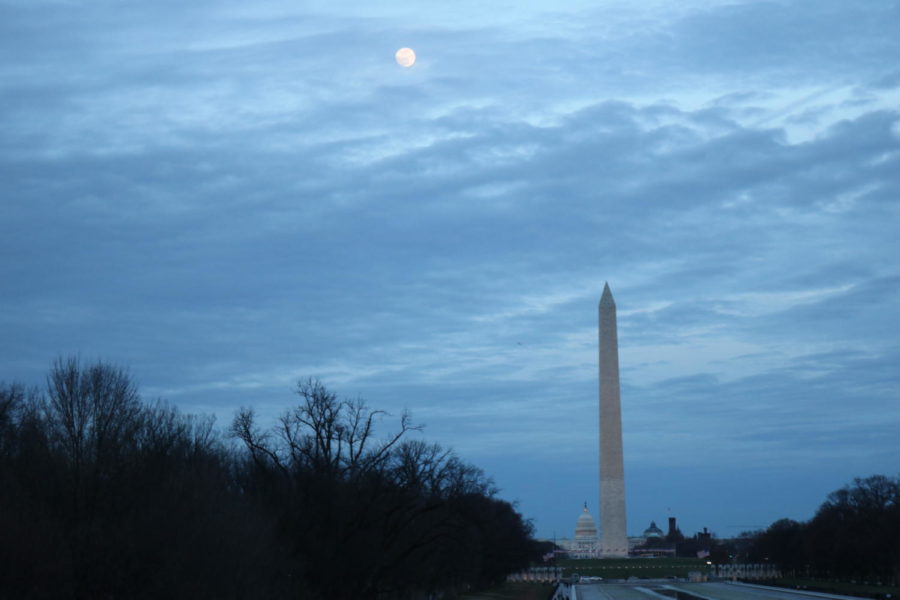Washington D.C. statehood bill moves past House to an unlikely Senate vote
April 28, 2021
Editor’s note: A previous version of this article misstated D.C. was larger in population than Virginia. It has since been corrected to state D.C. is larger than Vermont, the Daily regrets this error.
With a 216-208 party-line vote, the House has approved Washington D.C. for statehood. The bill now moves to the Senate for a vote.
The Democrat-sponsored bill, House Resolution 51, named to reflect the fact that D.C. would be the 51st state, would provide D.C. with one state representative and two senators for Congress.
It would also change the name from “District of Columbia” to “Douglass Commonwealth” in honor of abolitionist Frederick Douglass, who lived in Washington D.C.
Washington D.C. has just under 700,000 residents, more than two other U.S. states, Wyoming and Vermont. Also, with recent calls and focus on racial equality, D.C. has a population of 45 percent African American and while all paying federal taxes, no residents of D.C. have congressional representation.
Kelly Shaw, associate teaching professor of political science, said receiving that representation would be a benefit for D.C.
“D.C. residents would finally receive federal representation in the House and Senate given they have paid federal taxes all along,” Shaw said. “As a state, Washington would also have greater access to federal funds, such as recent funding given to states during the pandemic, which are not available to them now.”
The siege on the Capitol in January has prompted more calls for D.C. to obtain statehood for those unique state rights they lack.
“The 10th Amendment of the U.S. Constitution gives states certain rights vis-a-vis the federal government, and statehood would give Washington those additional rights,” Shaw said. “Of course, these arguments for statehood were accelerated by the Capitol siege in January, particularly in terms of President Trump calling out the D.C. National Guard to stop the siege. The D.C. mayor has argued that she should have powers over the D.C. National Guard, just like a governor has powers over a state’s National Guard.
Even with a 50/50 split in the Senate, with Vice President Kamala Harris providing the Democrats the tie-breaking vote, the Democrats would still need either 60 votes or would need to eliminate the filibuster.
Shaw said there are expenses and other costs associated with D.C. becoming a state and having to open up to federal responsibilities, but another issue is the 23rd Amendment, which grants the residents of D.C. the right to vote in presidential elections.
“The larger concern is the 23rd Amendment, which would need to be removed or otherwise altered if statehood were to be granted,” Shaw said. “That wouldn’t be impossible but would pose a significant hurdle since the removal of the 23rd would involve both Congress, which seems pretty split on the idea of granting statehood to D.C., and the existing states who are apt to largely oppose statehood for D.C.”
A common criticism toward Republican opposition is aimed at the idea that D.C. would almost guarantee two Democratic senators. However, there are nonparty-related issues as well.
“It is true that D.C. residents have a significant left lean to them, and thus D.C. senators would almost certainly be Democrats,” Shaw said. “Given the polarized nature of politics today and the fact that the Senate is split 50/50 between the two parties, granting statehood to D.C. would give the Democrats two additional senators. So yes, this is concerning certainly to the Republicans.”
D.C. trying to obtain statehood isn’t a new idea. Even since the passing of the 23rd Amendment in 1961, residents have been favorable toward statehood. In 2016, an overwhelming majority of residents polled favorably toward statehood and in 2020, an identical statehood bill passed the House.
Regardless of residential support, without any Republican support in the Senate for the bill and with five Democratic senators not signaling support, the bill is unlikely to pass the polarized Senate.

















